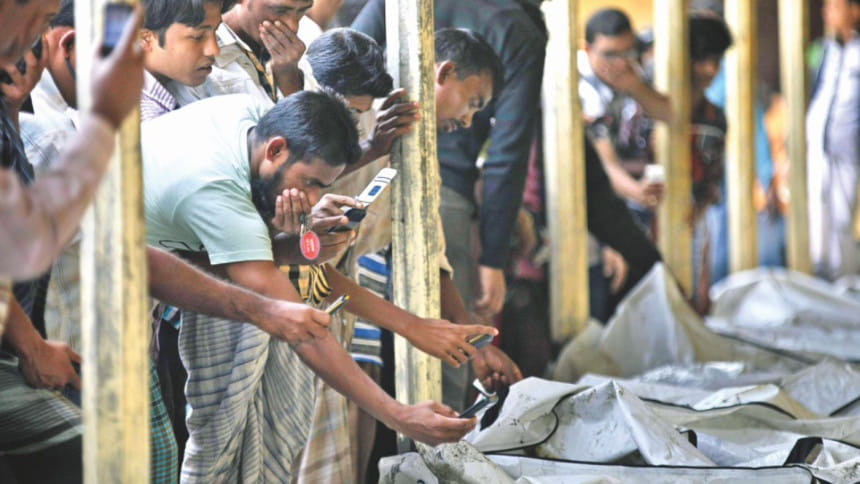Negligence most foul!

As the logic of capitalism stands, a man stabbing another to death is murder. But a man causing a hundred deaths because he consciously flouted basic safety and building regulations to maximise profits is business as usual. If I set fire to your factory, it's a crime. If I block all the fire exits and staircases in a building housing a thousand workers and lock the doors from outside so you can't leave when there's a fire, and you die, it's, apparently, an accident.
An alarming number of industrial deaths occur every year in this country, but we write them off as a chance occurrence for which no one is responsible, rather than confront them as a foreseeable result of gross indifference to human life for which owners bear criminal responsibility. When workers die in the same way, for the same reasons, year after year, can we continue to call them 'accidents' or do we acknowledge these deaths for what they are – structural killings?
From 2009-2013, at least 3,036 people died at 1,145 workplaces, of whom 247 died in fires, according to a survey by Safety and Rights Society and Bangladesh Legal Aid and Services Trust (BLAST). The number – which is only a conservative estimate anyway – should come as no surprise when we consider the impunity owners enjoy and the meagre compensation they have to pay in case of a worker's death. Where's the incentive, really, in raising costs to ensure safe workplaces for workers?
Twenty-five years have passed since the fire at Saraka garments in Mirpur, where 32 workers died in a stampede, when they panicked upon finding the main gate locked from outside following a fire. 'Justice for Saraka' never made it as a rallying cry, or even if it did, it drowned amidst the many lofty promises of liberalisation and the free market of the 90s. We set a precedent of locking factory gates and trapping workers, but not of holding management accountable. Since then, in the handful of instances where some form of legal action was initiated, the cases have been stalled, it seems, for an indefinite period and for inexplicable reasons.
It's been ten years since the Spectrum building collapse that killed 69 and injured 89 workers; and although 45 cases were filed against the factory owners, Shahriar Sayeed Hassan and Abul Hashem Fakir, they were never arrested. Following a writ petition by four human rights organisations, the High Court directed that the cause of the collapse be investigated, but the hearing on that is still pending. In 2006, 57 workers of KTS Textiles burnt to death; each floor as well as the main entrance was locked, the sole staircase was blocked with bales of garments, and there were no emergency exits in the building. Following a writ petition by ASK and BLAST, the HC ordered an inquiry and issued a show-cause notice to the ones responsible to define the cause and to state the preventative measures taken later. No progress thus far has been made, as KTS paid no heed to the writ or the court order.
With such disheartening precedent for justice for industrial deaths, it is a hopeful sign that after three years and relentless pressure from activist groups, a Dhaka court has framed charges against 13 people, including the two owners of Tazreen, Delwar Hossain and Mahmuda Akhtar, for the death of at least 112 workers. The accused were charged with murder under Section 302 of the Penal Code, culpable homicide not amounting to murder under Section 304, causing death by negligence under Section 304A, and voluntarily causing hurt under Section 323. Whether or not the prosecution will be able to convince the court of the accused's guilt and obtain exemplary punishment remains to be seen, but given the sheer extent of violations by the Tazreen owners and management, we have reasons to be optimistic that a new precedent will be set, and justice served for the untimely deaths at Tazreen.
In Bangladesh, there are not yet any provisions or laws for holding corporations or corporate bodies accountable for their criminal (in)actions. "Corporate manslaughter" - an act of homicide committed by a company or organisation - is not even a recognised concept yet in the country, despite the alarming number of industrial deaths every year in which the owner(s) or corporation can easily be held culpable. While errant owners can be charged under existing criminal laws, they often prove insufficient, as the provisions relating to homicide, hurt and negligence in the Penal Code are mainly based on direct physical act of an individual(s) against another individual(s). As such, legal scholars of the country note, if a person kills multiple people through his culpable action but does not engage in direct physical overt act, he may in fact be acquitted or, at any rate, face minimum punishment.
In the UK, the Corporate Manslaughter and Corporate Homicide Act 2007, states that corporate manslaughter is committed if "the way in which an organisation's activities are managed or organised causes a person's death; and amounts to a gross breach of a relevant duty of care owed by the organisation to the deceased". A similar legal framework for holding corporations accountable, particularly the inclusion of corporate manslaughter as a recognisable crime, can change the way owners and management act in this country.
The state has long sheltered the factory owners from any serious repercussions for their gross violations of existing laws and basic human rights, but it must remember that the pursuit of justice and protection of human lives can never be secondary to economic growth. For how long, seduced by the lure of export earnings, will we turn a blind eye towards the culpability of those who know fully well that, in violating safety codes, they are all but endangering the lives of the workers?
The writer is an activist and journalist.

 For all latest news, follow The Daily Star's Google News channel.
For all latest news, follow The Daily Star's Google News channel. 



Comments